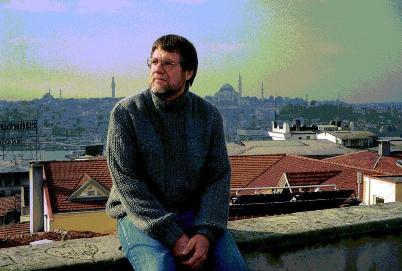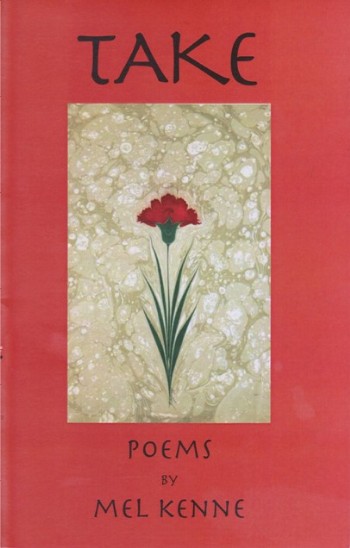Poetry Review: The Lyrical Restraint of Mel Kenne’s “Take”
Poet Mel Kenne, like a desert ascetic, has pared away everything that is not essential—no words have been wasted in the making of this collection.
Take by Mel Kenne. Muse-Pie Press, $12.
by Vincent Czyz
“A Spartan rule,” Guy Davenport tells us in “Shaker Light” (collected in his essay collection The Hunter Gracchus), “was to keep silent until you had framed what you had to say in the fewest possible words.” Indeed, the word laconic, according to some dictionaries, honors a Spartan named Lakonikus, who had apparently mastered this art of concision. I would not be surprised to learn that Mel Kenne, a native of Texas who transplanted himself some two decades ago to Istanbul, Turkey, has a Spartan great-ancestor; the poetry collected in Take, his sixth book of verse, certainly lives up to the Spartans’ verbal ideal. Which is not to say the poems are a few lines that disappoint in their brevity or that Kenne has substituted single words for full lines (though in a few cases he has); rather, Kenne, like a desert ascetic, has pared away everything that is not essential—no words have been wasted in the making of this collection.
Kenne’s subject matter ranges far over varied territory and includes the Greek ruins of “Capital” (cities abandoned before the turn of the first millennium are to be found all over his adopted country), a meditation on the eff word, a paean to a mangy, black cat with oversized testicles, ruminations on history as well as the former Constantinople, Turkish rugs (but of course), at least four poems for the departed (three of whom were poets), a narration from a hero out of Turkish folklore (“Majnun’s Song”), a nod to Pound’s Cantos (titled, appropriately enough, “The Cantos”), and quite a few other assorted topics.
The voice—wise, assured, wry—can sometimes feel detached, but by the time the poem sounds its last line, it is clear that Kenne is passionately involved with his topic. Certainly this is the case in “Turkish Time and Rain,” the title of which is more evocative than the verse of many a lesser author. Shuttling the reader between Texas and Kenne’s adopted city, from childhood to middle age, the poem gives us ending that is a bracing slap.
Restraint is also a hallmark of Kenne’s style. Describing the founder of modern Turkey in “A Turkish Dream,” for example, Kenne writes “he radiated an immanence . . . It was a glow like you might/see sometimes around/a newly erected statue.” Kenne chose something far more subtle for his comparison than the typical luminous object, whether firefly or celestial body, and no doubt more accurate. If I had the elbow room, I would reproduce all of Kenne’s “Negative Space.” Although it has a self-referential aspect I think contemporary poets would do well to be wary of, it’s so skillfully understated and so worthy of the elegaic mood it conjures up that I was won over.
Much as I enjoyed “Negative Space,” my favorite composition in the collection is easily “The Night Long,” which is a form of poetry so pure it should have its own genre.
The night long grieving your mad
hair blowing long outside, the slow
violins your song stretched through
each hour passed alone, see how
they return they pass by bend down
laboriously into the tide, the wind
they spend so much time, so long
movements broken into fragments
that lean one upon the other, now
they turn around and making no
sound, again they move . . .
I’ve stopped about two-thirds of the way through; you’ll have to lay hands on a copy if you want to finish—and finish you should. Phantasmagorical, elusive, and possessed of a haunting beauty, this poetry does what no ordinary prose—with its concerns for the straight-edged, the clearly defined, the pragmatic and encapsulated—can do, and it does it without degenerating into the sort of gibberish so often tendered as “avant-garde” verse.

Mel Kenne — His voice, wise, assured, wry, can sometimes feel detached, but by the time the poem sounds its last line, it is clear he is passionately involved with his subject.
My gripes are few—two actually. Sometimes the image is refined out of the poem, the words becoming abstractions; without anything concrete to anchor them, they can’t stand their ground. This is the case in the following stanza from “Americans”:
We labor on,
back at the grind each day
to make the world grow more,
and more in ways that will continue
to remind us of what we’ve done
and repay us for the constancy
of our daily toil.
My other peeve, which encompasses four of the last five poetry collections I read, is the need to reference poetry/poets to the point of distraction—that is, poetry about poetry or about writing poetry. Imagine if Picasso had put himself, brush in hand, in Guernica. Imagine, at the feet of Michelangelo’s David, a marble likeness of Michelangelo Buonarotti with chisel in hand. Sometimes exploration of the medium is worthwhile, even necessary, but most of the time it simply takes the reader out of the poem and speaks to other poets rather than to a larger readership.
These complaints, however, are more than counterbalanced by “the gold dust of startling realizations” we find in this collection—and how much better that line is (from “Turns and Returns”) as metaphor than as simile, how striking, how artfully conveyed. If Kenne had a middle name, I believe its initial would be L.

